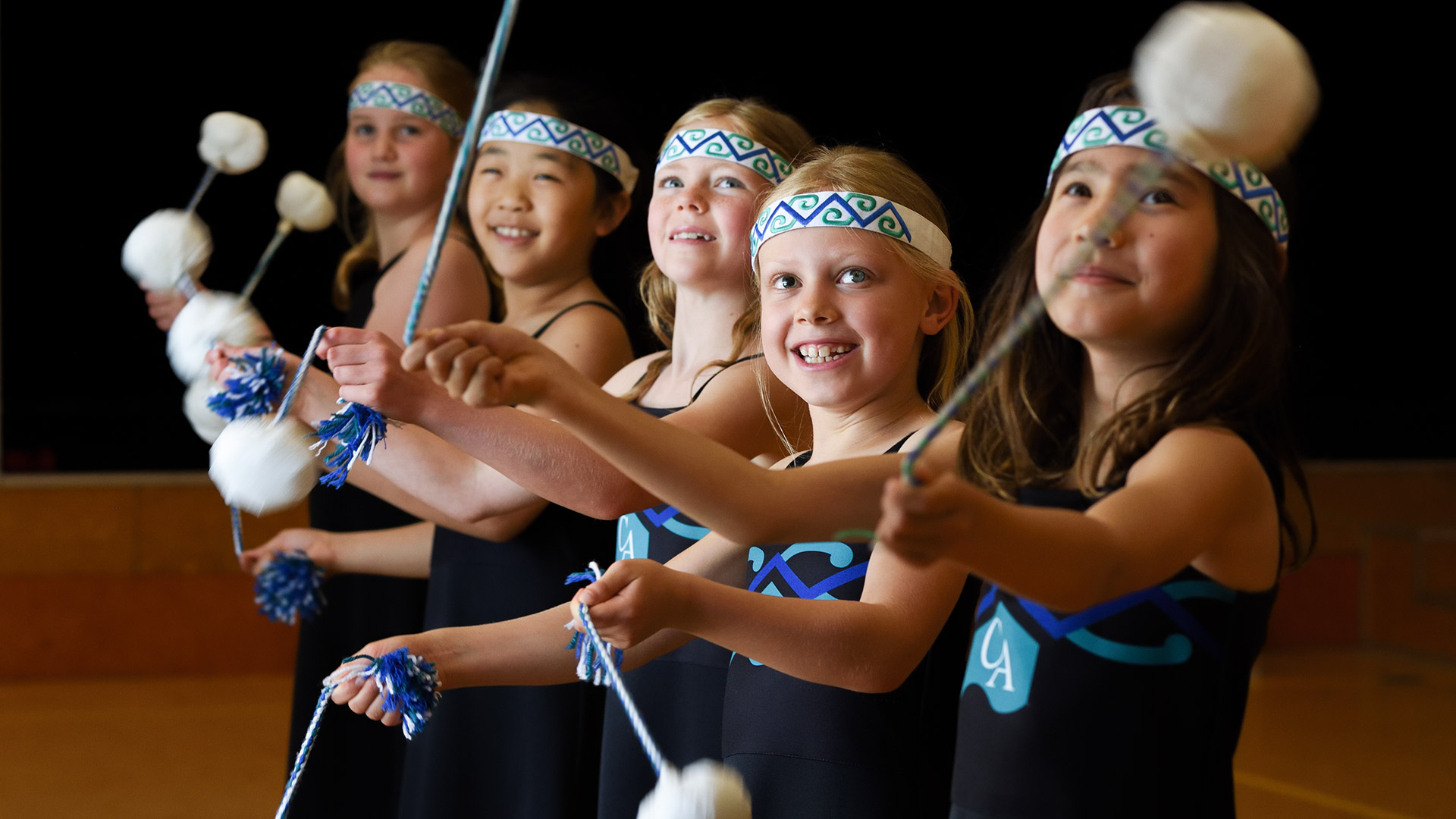We have a strong and special connection with Whaea Diane and Maraeroa Marae in Porirua. We remember the love and support that Whaea Diane and her late husband Matua Waata has given us over the years. Our Year 3s and 4s visit Maraeroa, with our Year 4s experiencing a Noho Marae (sleepover) each year; participating in a pōwhiri (welcome ceremony) as manuhiri/visitors, learning the history of Maraeroa, and sharing pūrākau (cultural narratives) .
We are proud to offer Kapa Haka at Cashmere Avenue School, providing valuable opportunities for our students to develop confidence through performance in a te ao Māori space. Under the guidance of Whaea Shareen and Matua Kaya, our students are encouraged to participate in Kapa Haka, and hone their skills. One of the highlights of our Kapa Haka journey is our participation in the Northern Zone’s St Brigid’s Kapa Haka Festival, a community event that typically draws an audience of over 1000 people throughout the day.
Kapa Haka plays a pivotal role in fostering an appreciation for the Māori language and cultural values among our students. In terms one and four, all children at Cashmere Avenue School participate in regular Kapa Haka sessions. In Terms 2 and 3 we focus our sessions for those children who are committed to be in Performance Rōpū- preparing for our big performance experience at the St Brigid’s Festival.
If you would like to attend and be part of our Kapa Haka sessions, please contact your child's classroom teacher. We would love to have you join our sessions!
Te Ao Māori Education
We are committed to giving mana to Te Tiriti o Waitangi, and ensuring all of our children at Cashmere Avenue learn about Te Ao Māori/Māori culture. Our Board and Staff have a commitment to growing our capability and our culturally responsive practice. Our dedicated kaiako (teachers) and kaiawhina (support staff) ensure Te Reo Māori is part of our children’s everyday learning experience.
When you visit our school, you will hear our learners using Māori greetings and expressions, and being familiar with waiata (Māori songs). To further support your engagement with te reo Māori at home, we have provided video links for you to practise some karakia that we use in our daily routines.
From age of 5, our students begin learning their mihimihi, a basic personal introduction in Māori. They are encouraged to introduce themselves by sharing their heritage and whānau. We welcome students to bring their own mihimihi to school if they already have one. Many iwi have their own structure and order to a pepeha or mihimihi. We have provided generic templates along with audio links for you to practise at home.
We offer an Ako program that celebrates the Tuakana-Teina approach, enabling older students and younger students to learn from one another about Te Ao Māori (the Māori world). Our children are grouped from Year 0-6, and with siblings and cousins, and work together as an Ako group throughout their time at CAS. The Ako program encompasses various aspects of Māori culture, including history, art, language, performance, and storytelling.
At Cashmere Avenue School, we are dedicated to fostering a deep appreciation for Māori culture and language, creating a rich and inclusive educational environment for all our students.
Matariki
Maramataka, and the rising and setting of the Matariki cluster holds significant cultural and spiritual importance, marking the beginning of the Māori New Year and inviting a period of reflection and celebration. At Cashmere Avenue School (CAS), we celebrate Matariki, and integrate it into our school calendar in meaningful ways.
Our annual Matariki Event serves as a focal point of celebration and learning for our school community. We start the day with a ceremony and shared kai (food) with our school community, and follow this with a full-day event- with a range of workshops for our tamariki to choose from. These workshops encompass a variety of activities, including kai (food) creation, gardening, astronomy, waiata (songs), kite making, lantern crafting, poi making, kanikani (dance), and harakeke (flax) weaving.
We invite our whānau (families) to join us in this annual celebration, as we come together to embrace the rich tapestry of Māori culture and heritage, and learn more about Matariki and Maramataka.
Whānau Hui and Mihi whakatau
Whānau Hui gatherings are held each term. These Whānau Hui serve a vital purpose within our school community by fostering and strengthening whanaungatanga/relationships and connectedness, among our community.
At these gatherings, we value the voices and perspectives of our whānau members, as they provide insights into how our school can best empower Māori students to learn as Māori.
If you wish to express your interest in participating in our Whānau Hui or if you have any questions keep an eye on our School Calendar and Newsletter for information on upcoming dates, or check in with your child's classroom teacher. We look forward to welcoming you and hearing your ideas to enhance the educational journey of our Māori students and the entire school community.
Mihi whakatau
Each term, we have a Mihi Whakatau ceremony to warmly welcome all new whānau (families) who have joined our school community. This Mihi Whakatau ceremony follows the cultural protocols and practices of Te Atiawa. In addition to extending our welcome to new members, we invite our current community members to participate, fostering a sense of kotahitanga (unity) as we collectively greet our new whānau.
To stay informed about the upcoming Mihi Whakatau ceremonies, please refer to our school calendar and newsletter for specific dates and details. In preparation for these special occasions, we provide waiata (welcoming songs) along with audio links, enabling you to practise these at home to enhance your participation in our welcoming ceremonies.
(Note: The term "Pōwhiri" has been replaced with "Mihi Whakatau" to accurately reflect the nature of the welcoming ceremony)
